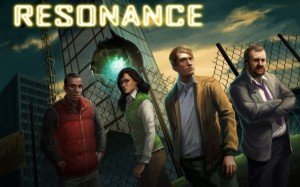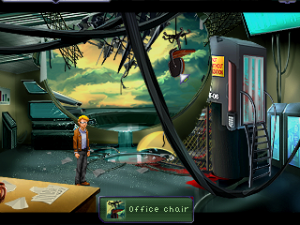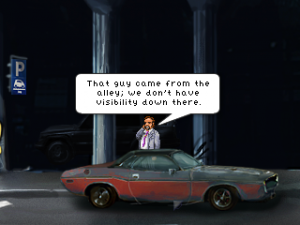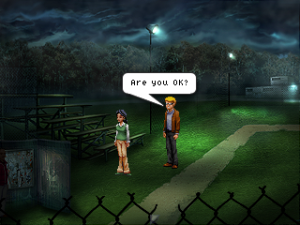
It’s hard to understand the argument that adventure games are dead. Sure, we don’t get the major releases from LucasArts and Sierra like back in the day, but the indie community has stepped up to the plate with tons of new and brilliant adventure titles in every kind of style you could want. Foremost among the new wave of adventure gaming is Wadjet Eye Games, a brilliant developer and  publisher of some of the best retro adventure games in recent years. With excellent titles like the paranormal detective series of Blackwell and the fantastic science-fiction/noir Gemini Rue, Wadjet Eye has ascended to a premier spot in the indie game community. Part of the charm is how all of the games they develop or publish look like they came out of the golden age of adventure games, typically due to the AGS Engine they commonly share. But beyond technical similarities, all of the games share a common style and gameplay design. Their latest opus is Resonance, a co-production between xii games and Wadjet Eye. Resonance definitely shares the same familiar style and logical brand of puzzle design, but manages to fix any lingering problems and introduce truly exciting new mechanics and some incredibly gripping writing. This is truly one of the best adventure games ever made.
publisher of some of the best retro adventure games in recent years. With excellent titles like the paranormal detective series of Blackwell and the fantastic science-fiction/noir Gemini Rue, Wadjet Eye has ascended to a premier spot in the indie game community. Part of the charm is how all of the games they develop or publish look like they came out of the golden age of adventure games, typically due to the AGS Engine they commonly share. But beyond technical similarities, all of the games share a common style and gameplay design. Their latest opus is Resonance, a co-production between xii games and Wadjet Eye. Resonance definitely shares the same familiar style and logical brand of puzzle design, but manages to fix any lingering problems and introduce truly exciting new mechanics and some incredibly gripping writing. This is truly one of the best adventure games ever made.
The truly great tent pole of Resonance is the story line, in terms of plotting, pacing and how the story is told. The game uses multiple protagonists, a sadly underused game mechanic, which gives you four perspectives on the same prologue before slowly bringing the four distinct threads together. There’s Ed, the nebbish mathematician, Anna, the sweet doctor and Ed’s crush, Ray, an investigative blogger, and Detective Bennett, a loose cannon who plays by his own rules. The prologue introduces all of these threads separately by one overarching event (a citywide blackout), but soon brings the characters together on a search for Anna’s lost birthright and the mysteries behind a new type of energy known as Resonance.  It’s a great hook for a story and a great hook for gameplay. During the majority of the game, you can control all four characters, swapping between them at will to use each character in certain required scenarios. For example, Detective Bennett has no issues visiting the police headquarters, while only Anna will be able to visit the upper levels of the hospital. Using these characters in conjunction with each other makes for incredibly interesting puzzles, while using the characters separately allows for some neat storytelling.
It’s a great hook for a story and a great hook for gameplay. During the majority of the game, you can control all four characters, swapping between them at will to use each character in certain required scenarios. For example, Detective Bennett has no issues visiting the police headquarters, while only Anna will be able to visit the upper levels of the hospital. Using these characters in conjunction with each other makes for incredibly interesting puzzles, while using the characters separately allows for some neat storytelling.
Even without the innovate structure, the story would still be incredible. It’s a wrenching plot, full of surprise twists, emotional moments, and genuine intrigue. Unlike Gemini Rue or the Blackwell series, there’s no exotic setting or fantasy elements to set the game apart. It’s just a semi-realistic story set in the near future with many current issues and themes, and it certainly makes you think about real debates in the world, like privacy vs. national security. These sorts of moral questions are even reflected in the game’s multiple endings. Like so many games, the point of divergence for  Resonance is a series of very clear “either, or” questions. But unlike most games, there’s no “best” ending, or even a truly “good” one. Every choice asks you to seriously think deep about the ramifications of what you’re doing, but even when you do, you can’t predict the results. It’s the kind of decisions that make you think that you absolutely have to play the game again to see what would have happened differently, because the series of events witnessed in my run through the game used a completely devastating twist and a seriously gutsy narrative direction.
Resonance is a series of very clear “either, or” questions. But unlike most games, there’s no “best” ending, or even a truly “good” one. Every choice asks you to seriously think deep about the ramifications of what you’re doing, but even when you do, you can’t predict the results. It’s the kind of decisions that make you think that you absolutely have to play the game again to see what would have happened differently, because the series of events witnessed in my run through the game used a completely devastating twist and a seriously gutsy narrative direction.
Even the best adventure game stories can be stopped in their tracks by bad puzzle design, but Resonance has some very good design to back it up. Often, you’ll find two kinds of adventure games. One style uses completely arbitrary puzzles with no sensible solution that require the player to click on everything and use every item they have on every object. The other is a more grounded take on puzzles, rooting every solution into a logical sequence that makes sense. Resonance is firmly rooted in the latter school of puzzle design. That’s not to say that the puzzles are easy, because they can really  stretch your brain at times. However, they are all rooted in basic logical sense that makes you think “of course, why didn’t I get it before?” when you figure out the solution. The four characters do complicate this a bit, but if you look at each inventory, each memory, and each location thoroughly, the solution will almost always come to you. If you’re really stuck, talking to one character with another will provide hints about what to work on.
stretch your brain at times. However, they are all rooted in basic logical sense that makes you think “of course, why didn’t I get it before?” when you figure out the solution. The four characters do complicate this a bit, but if you look at each inventory, each memory, and each location thoroughly, the solution will almost always come to you. If you’re really stuck, talking to one character with another will provide hints about what to work on.
There are so many other things to love about the game. Take the voice acting, for example. Wadjet Eye games typically have some spotty voice acting that can vary wildly, but every single actor in Resonance is perfectly cast and does a great job of bringing the game to life. Or look at the short-term and long-term memory system, which is a great and innovative way to recall important details or ask specific characters about particular objects. Even the graphics are some of the best retro adventure graphics to date, with hugely detailed environments and fantastic animation behind the pixelated sprites.
If you’re not an adventure game fan, Resonance probably won’t be the game to sway you. For die-hard adventure game players, Resonance is one of the best games ever released in the genre and will absolutely blow you away. Anyone with an interest in pointing and clicking their way through a game absolutely needs to play it, as it truly is a modern adventure game masterpiece.
Rating: 









This review is based on a review copy of the Steam version of Resonance provided by Wadjet Eye Games.

